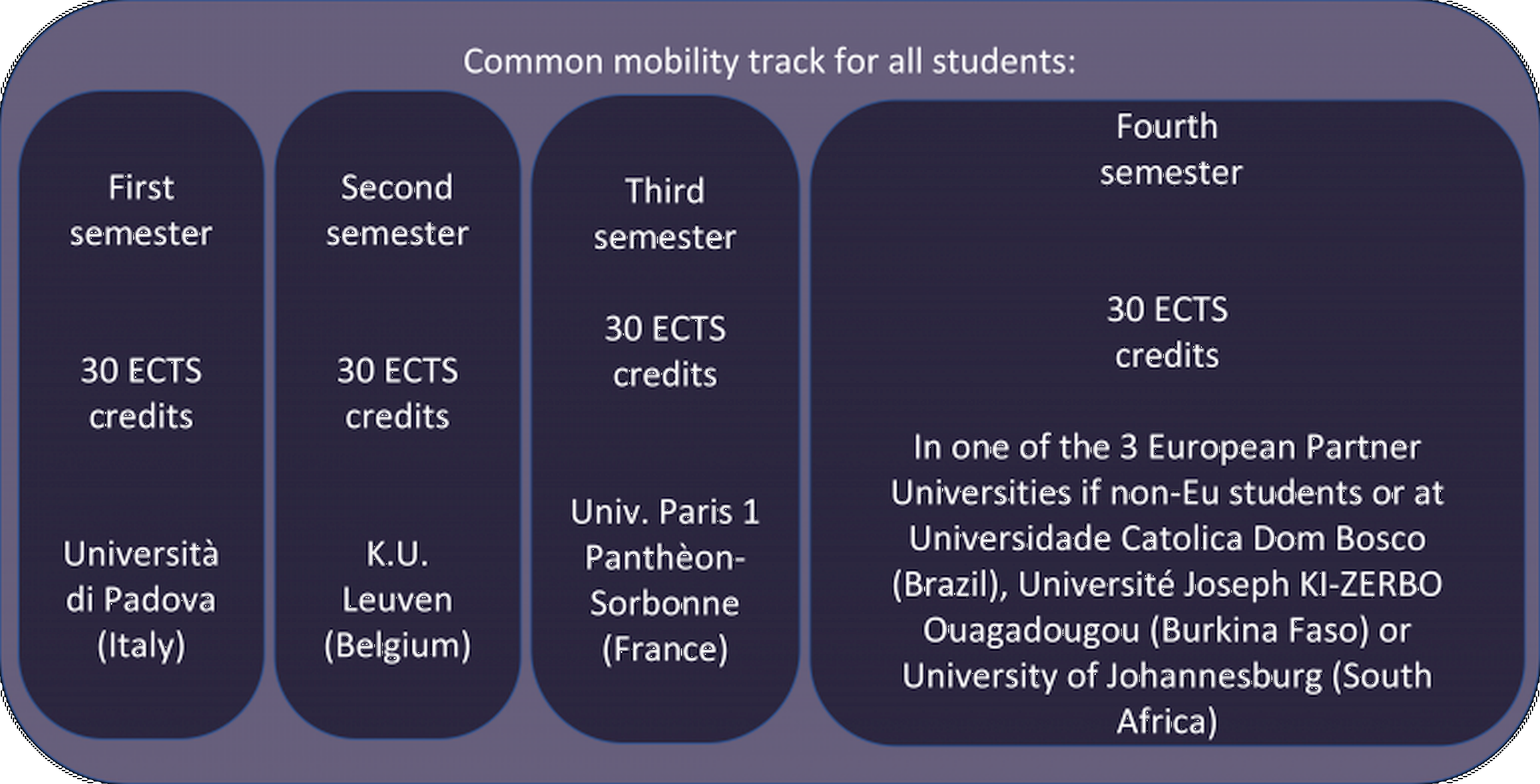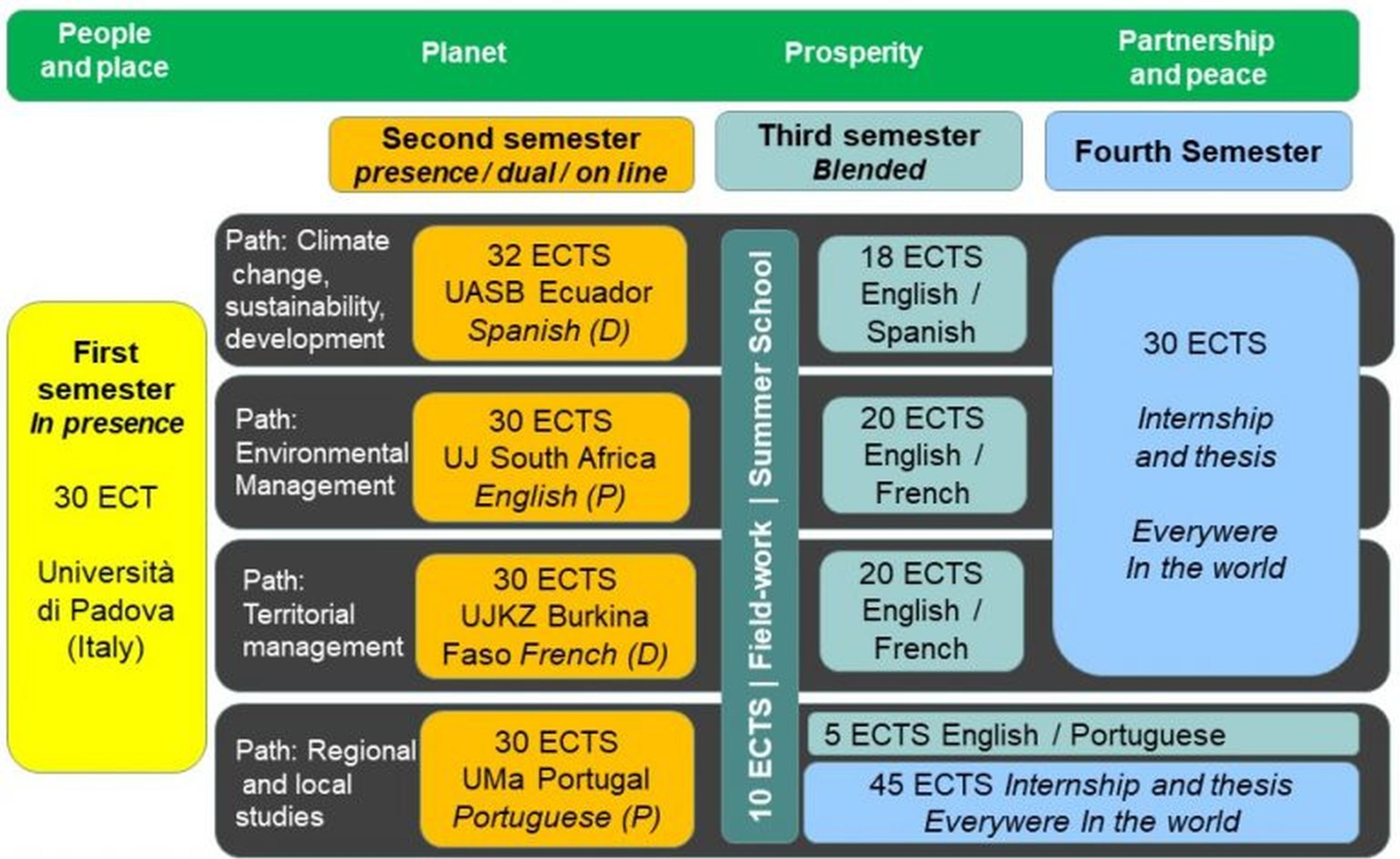The Erasmus Mundus Joint Master’s “Climate Change and Diversity: Sustainable Territorial Development” (CCD-STeDe) is rooted in the actions implemented since 2019 as the evolution of the International Joint Master Degree previously named Sustainable Territorial Development (STeDe), created under the Erasmus Mundus Programme and ran for 8 intakes (2010-2014 | 2016 – 2020). STeDe was previously developed and implemented by 4 Universities: Università degli Studi di Padova, Italy – UniPD; Katholieke Universiteit Leuven, Belgium – KU Leuven; Université Paris 1- Panthéon Sorbonne, France – Paris 1; Universidade Catòlica Dom Bosco, Brazil – UCDB.
PROGRAMME STRUCTURE
Until 2019/2020
BATCH 11 (2021/2022)
CURRENT PROGRAMME (FROM BATCH 12 ONWARDS | A.Y. 2022/2023)
From the XII edition (2022/2024) onwards, the International Joint Master Program, combining roots and attitudes to change, adopts four novelties:
- The new name “Climate Change and Diversity: Sustainable Territorial Development” (CCD-STeDe)
- The possibility to choose among four academic paths
- The work in four languages: English for all and, depending on the academic path, Spanish or Portuguese or French as a second language
- The combination of different learning modalities: in presence, online, blended
TEACHING UNITS
1st SEMESTER
TEACHING UNITS (2021/2022) – IN PRESENCE AT UNIVERSITY OF PADUA
CU1: Communication, culture and the knowledge of Italian socio-cultural environment (3 ECTS)
CU2: Territory, development and alternatives (6 ECTS)
Unit A: Microfinance for territorial change (3 ECTS)
Unit B: Alternatives to development and territorial practices of post development(3 ECTS)
CU3: Geovisualization of territorial change: Digital Earth and Participatory GIS (6 ECTS)
CU4: Environmental conflicts, climate justice and social impact assessment (6 ECTS)
CU5: Tools an paths for sustainable territorial change (9 ECTS)
Choice from:
Cultural Issues in territorial change (3 ECTS)
Data analysis in territorial transition (3 ECTS)
Group Dynamics and Transformative Learning (6 ECTS)
A.Y. 2020/2021 – IN PRESENCE AT UNIVERSITY OF PADUA
CU1 : Communication, culture and the knowledge of Italian socio-cultural environment (3 ECTS)
CU2 : Territory, development and alternatives (6 ECTS)
Unit A: Microfinance for territorial change (3 ECTS)
Unit B: Alternatives to development and territorial practices of post development (3 ECTS)
CU3 : Geovisualization of territorial change: Digital Earth and Participatory GIS (6 ECTS)
CU4 : Climate Justice, Conflict management and transformative learning (6 ECTS)
Choice from:
Environmental conflicts, climate justice and social impact assessment (6 ECTS)
Group Dynamics and Transformative Learning (6 ECTS)
CU5 : Tools an paths for sustainable territorial change (9 ECTS)
Choice from:
Cultural Issues in territorial change (3 ECTS)
Data analysis in territorial transition (3 ECTS)
Environmental Economics and Resource Valuation (6 ECTS)
Recycling and reuse of raw materials (6 ECTS)
Human computer interaction (6 ECTS)
Biodiversity, landscapes and human well being: Europe and the world (6 ECTS)
TEACHING UNITS (2019/2020 – in presence)
CU1 : Communication, culture and the knowledge of Italian socio-cultural environment (3 ECTS)
CU2 : Group Dynamics and Transformative Learning (6 ECTS)
CU3 : Project planning and evaluation (6 ECTS)
CU4 : Environmental and Social Responsibility in Local Development Process (6 ECTS)
CU5 : How to Measure the Impact of Local Development (6 ECTS)
CU6 : How to Enhance Group Dynamics: Issues in Sustainable Development, Intercultural Dialogue and Territoriality (4 ECTS)
CU7 : Territorial Development and GIS (6 ECTS)
2nd SEMESTER – 2021/2022 UNIVERSIDAD ANDINA SIMÓN BOLÍVAR (QUITO, ECUADOR) – ON LINE AND IN PRESENCE
TEACHING UNITS
CU0 : Comunicación, cultura y conocimiento del entorno sociocultural ecuatoriano (no ECTS)
CU1 : Herramientas para investigación en adaptación al cambio climático (8 ECTS)
- GIScience y Geodesign en las transiciones territoriales (4 ECTS)
- Técnicas cuantitativas de investigación en las áreas social y ambiental (4 ECTS)
CU2 : Cambio climático: Energía y Recursos Naturales (12 ECTS)
- Cambio climático: climatología, pluviosidad y gestión hídrica (4 ECTS)
- Energía: Fuentes, eficiencia y consumo (4 ECTS)
- Cambio climático, soberanía y seguridad alimentaria (4 ECTS)
CU3: Alternativas de mitigación y adaptación (12 ECTS)
- Adaptación, mitigación y vulnerabilidad en ecosistemas andinos y amazónicos (4 ECTS)
- Cambio climático, planificación, gestión forestal y ordenamiento territorial. Alternativas de mitigación y adaptación (4 ECTS)
- Economía política del cambio climático (4 ECTS)
2nd SEMESTER – Till 2020/2021 KU Leuven – in presence
TEACHING UNITS
CU1 : Communication and Knowledge, and Socio-cultural and Economic Environment of Belgium (3 ECTS)
CU2 : Spatial Management (9 ECTS)
Choice from:
Strategic Spatial Planning (6 ECTS)
Geography of Developing Countries (6 ECTS)
Critical Review of Sustainable Development Policies and Planning (3 ECTS)
Society – Environment Interactions (3 ECTS)
Natural Risk Management (3 ECTS)
Landscape urbanism (3 ECTS)
Urban political ecology (3 ECTS)
CU3 : Intercultural and tourism destination management (6 ECTS)
Choice from:
Tourism, Globalisation and Sustainable Develoment (3 ECTS)
Culture and Tourism (3 ECTS)
Heritage and Sustainable Tourism Development (3 ECTS)
Conservation Policies (3 ECTS)
CU4 : Integrated project from the place/destination management practice (9 ECTS)
Destination Management (from site to landscape) (6 ECTS)
Place Management (from neighbourhood to region) (6 ECTS)
Destination Management Assignment (from site to landscape) (3 ECTS)
Place Management Assignment (from neighbourhood to region) (6 ECTS)
CU5 : Free choice of the student among offered courses (6 ECTS)
3rd SEMESTER
INTAKE 2021/2022 BLENDED (UASB and UNIPD)
TEACHING UNITS
CU1 : Cambio climático y economías alternativas (12ECTS) (virtual campus)
- Cambio climático: Evidencia científica (4 ECTS)
- Economía Ecológica (4 ECTS)
- Agricultura, cambio climático y Salud (4 ECTS)
International summer school and fieldwork in Africa (in presence)
CU2 : Biodiversity, Landscapes and human well being (6 ECTS)
CU3 : Emerging issues in tourism and territorial transitions (4 ECTS)
CU4 : Economy, resources, technology (6 ECTS) (virtual campus)
Choice among the following courses:
- Environmental Economics and Resource valuation (6 ECTS)
- Recycling and reuse of raw materials (6 ECTS)
3rd SEMESTER
Intake 2020/2021 Université Paris 1 Panthéon – Sorbonne – in presence
TEACHING UNITS
CU0: French Language (0 ECTS)
CU1: Communication, culture and the knowledge of French socio-cultural environment (3 ECTS)
CU2: Mandatory courses (21 ECTS)
Module 1: Economie, développement durable et territoires (Min. 9 ECTS)
Choix parmi / Choice among the following courses:
Stratégies territoriales durables – Territorial strategies for sustainability (3 ECTS)
Economie et politiques de l’environnement – Environmental economics and policy (3 ECTS)
Entreprises et développement durable – Business and sustainable development (3 ECTS)
Finance et développement durable – Finance and sustainable development (3 ECTS)
Urbanisation et développement durable – Urbanization and sustainable development (3 ECTS)
Module 2: Stratégies locales (Min. 6 ECTS)
Choix parmi / Choice among the following courses:
Développement économique local – Local economic development (3 ECTS)
Services publics locaux et commande publique – Local public services (3 ECTS)
Evaluation des politiques publiques territoriales – Evaluation of public and territorial politics (3 ECTS)
Conduite d’un projet de territoire – Territorial project management (3 ECTS)
Transports et aménagement – Transport and territorial management (3 ECTS)
Module 3: Outils (Min. 3 ECTS)
Choix parmi / Choice among the following courses:
Analyse des données – Data analysis (3 ECTS)
Econométrie appliquée – Applied econometrics (3 ECTS)
Techniques d’enquête – Survey methodology (3 ECTS)
Cartographie SIG – Cartography GIS (3 ECTS)
Till Intake 2019/2020 Université Paris 1 Panthéon – Sorbonne – in presence
TEACHING UNITS
CU0: French Language (0 ECTS)
CU1: Communication, culture and the knowledge of French socio-cultural environment (3 ECTS)
CU2: Mandatory courses (21 ECTS)
Module 1: Economie, développement durable et territoires (Min. 9 ECTS)
Choix parmi / Choice among the following courses:
Stratégies territoriales durables – Territorial strategies for sustainability (3 ECTS)
Economie et politiques de l’environnement – Environmental economics and policy (3 ECTS)
Entreprises et développement durable – Business and sustainable development (3 ECTS)
Finance et développement durable – Finance and sustainable development (3 ECTS)
Module 2: Stratégies locales (Min. 6 ECTS)
Choix parmi / Choice among the following courses:
Développement économique local – Local economic development (3 ECTS)
Economie numérique et développement du territoire: Information et dynamique territoriale – Digital economy and territorial development: Territorial information and Dynamics
Choix de localisation et dynamiques regionales – Location choices and territorial dynamics (3 ECTS)
Services publics locaux – Local public services (3 ECTS)
Evaluation des politiques publiques territoriales – Evaluation of public and territorial politics (3 ECTS)
Conduite d’un projet de territoire – Territorial project management (3 ECTS)
Module 3: Outils (Min. 3 ECTS)
Choix parmi / Choice among the following courses:
Analyse des données – Data analysis (3 ECTS)
Econométrie appliquée – Applied econometrics (3 ECTS)
Techniques d’enquête – Survey methodology (3 ECTS)
Cartographie SIG – Cartography GIS (3 ECTS)
CU3: Workshop (6 ECTS)
4th SEMESTER
INTAKE 2021/2022
UNIVERSITÀ DEGLI STUDI DI PADOVA, UNIVERSIDAD ANDINA SIMÓN BOLÍVAR (QUITO, ECUADOR), UNIVERSITÉ DE OUAGADOUGOU, UNIVERSITY OF JOHANNESBURG
Internship (12 ECTS) and Thesis (18 ECTS) are jointly carried out under the responsibility of one of the 4 partner Universities, where the student is spending his/her 4th semester (host University). The case study can also be outside the Country of the host University. The Student can carry out only one internship from the 4th semester onwards, also in case of late graduation.
4th SEMESTER
Intake 2020/2021
Università degli Studi di Padova, Katholieke Universiteit Leuven, Université Paris 1 Panthéon-Sorbonne, Universidade Catolica Dom Bosco, Université de Ouagadougou, University of Johannesburg
Internship (12 ECTS) and Thesis (18 ECTS) are jointly carried out under the responsibility of one of the 6 partner Universities, where the student is spending his/her 4th semester (host University). The case study can also be outside the Country of the host University. The Student can carry out only one internship from the 4th semester onwards, also in case of late graduation.
Till Intake 2109/2020
Università degli Studi di Padova, Katholieke Universiteit Leuven, Université Paris 1 Panthéon-Sorbonne, Universidade Catolica Dom Bosco, Université de Ouagadougou, University of Johannesburg
Internship (12 ECTS) and Thesis (18 ECTS) are jointly carried out under the responsibility of one of the 6 partner Universities, where the student is spending his/her 4th semester (host University). The case study can also be outside the Country of the host University. The Student can carry out only one internship from the 4th semester onwards, also in case of late graduation.
Non-EU Scholarship Holders will have their 4th semester at one of the European Universities of the consortium. EU Scholarship Holders will have their 4th semester at the Universidade Catolica Dom Bosco, Université de Ouagadougou, University of Johannesburg. Exceptions could be considered, if adequately motivated. The Committee will have the final decision.
Self-sponsored students do not have any limitations in choosing the hosting institution for their 4th semester.






